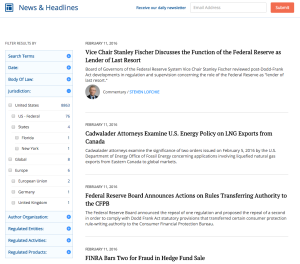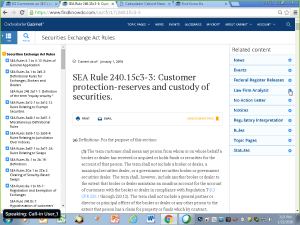Some cabinets are bare, some are well stocked, some are chaotic, and some are organized. Cadwalader Cabinet, an online legal service covering financial regulations is not only well-stocked and well-organized, it is lovely to look at.
I have a long standing interest and monitor developments in large law firm online systems. See my list large law firm online legal systems and online legal service blog posts. So in January, I spoke with Steven Lofchie, the Cadwalader, Wickersham & Taft LLP partner behind the Cabinet.
Cadwalader Cabinet targets broker dealers, investment banks, hedge funds, commodity pools, some mutual funds, and the agencies regulating these institutions. It brings together in one place multiple content types, including rules from multiple agencies, statutes, news, a library of resources, calendar of agency hearings and industry events, and lawyer commentary on new rules and other regulatory developments.
Coverage and Content
The Cadwalader Cabinet covers a broad list of topics related to financial markets regulation:
| Class action | Currency + virtual conference | FCPA | Policy |
| Commodity Exchange Act | Dodd-Frank | Insider trading | Sanctions |
| Conflict Minerals | Energy | Hart Scott Rodino | State Law |
| Contracts | ERISA | LIBOR + indices | Volcker Rule |
| Credit & insolvency | FATCA | Legislation | Whistleblower |
Steve reports that a key part of the value of Cadwalader Cabinet is content curation. He and other lawyers spend substantial time reviewing, choosing, and editing the content that appears online. He explained that this curation and the rich links across content is why the firm has some subscribers in agencies.
Personally, I value curation. I pass on free news and pay for the New York Times, Wall Street Journal, and Business Week. I trust the editors at each to do a good job curating. Steve suggested that many Cabinet subscribers view Cadwalader for law in the way I view these for news.
Cadwalader Cabinet Features
The user interface has many nice features. Examples include regulatory status tables, personal bookmarks, recent history, and “my interests” to track specific types of items. The faceted search is particularly nice. The screen shot below illustrates how users can narrow searches using selectors on the left:

Similarly, the presentation of statutory material is well conceived. The screen shot below illustrates navigation on the left, content in the center, and links to related content on the right:

I especially like the tools and experts systems in the Cabinet. The firm built a suite of it own tools and expert logic systems, branding them “Mycroft”. The Mycroft landing page lists tools for analysis of regulatory questions, checklists of work accomplished or reviews performed, creation of standardized contracts and certificates, and creation of a work flows, among others.
Business Model
Basic access to Cadwalader Cabinet is free. Free users can see a fair bit of content; on many pages, links to premium content (requires subscription) are highlighted. I like the freemium model and do not recall seeing it before in a large law firm online system.
Subscriptions prices range from $2,500 to $100,000 per year depending on the subset of content selected and number of users. For example, the price for just laws and rules is lower than for legal commentary.
When I interview law firms about online systems, I do not ask about revenue or profitability. Nor do I ask how firms award “credit” back to authors / curators. As legal online services grow in large law firms, management will need to address these issues and be more open about them. I look forward to the day when firms will happily go on the record on the finances.
Building Cadwalader Cabinet Content and Platform
The challenge most law firms face in building online systems is persuading lawyers to create, curate, and maintain content. In a world still dominated by the billable hour (talk otherwise notwithstanding), persuading lawyers to spend non-billable time on content tasks has long been an uphill battle.
Steve is clearly the moving force behind Cadwalader Cabinet. I first spoke to Steve in 2012 and recall him saying “this is how I practice.” What started as a tool he created to support his own practice has greatly expanded. Now, many Cadwalader lawyers regularly contribute. And they too use the system in their own practices.
The firm custom built the system using some home-grown technology and a variety of commercial software, off-the-shelf-software, including a content management system, search engine, home grown logic systems, and expert system.
Conclusion: Big Law Online Legal Services and Cadwalader Cabinet
My list large law firm online systems grew in 2015, a development I like to see. I now count 20+ Am Law 100 firms. Though many listed services are for narrow areas of law, I take the increase and absolute number as a good sign: firms increasingly see value in offering this alternative to traditional advice by the hour.
Metrics and ratings of online legal services lack. Over time, anecdotally, I have seen expansion from primarily content-based systems to ones that offer an increasing number of tools and richer content. That combination offers the most value and the Cadwalader Cabinet, with both broad and deep content and tools, is an excellent example. We can hope for a day that so many firms offer so many online services that metrics or ratings will emerge.
[Disclosure: Tom Baldwin, who is joining Fireman & Company, the consulting company where I work, was the CIO at Cadwalader until recently. During his tenure, Tom and his team significantly upgraded the Cabinet user interface (UI). Steve first showed me Cabinet in August 2012. I was impressed with the content but not the UI, so I passed on a blog post. Three-plus years and a totally new interface make a big difference. Tom joining did not influence my decision to blog now. When I learn about new online legal services, I often blog about them; for example, see my January post featuring expert system based on Neota Logic by Akerman and Foley & Lardner.]
Archives
Blog Categories
- Alternative Legal Provider (44)
- Artificial Intelligence (AI) (57)
- Bar Regulation (13)
- Best Practices (39)
- Big Data and Data Science (14)
- Blockchain (10)
- Bloomberg Biz of Law Summit – Live (6)
- Business Intelligence (21)
- Contract Management (21)
- Cool Legal Conferences (13)
- COVID-19 (11)
- Design (5)
- Do Less Law (40)
- eDiscovery and Litigation Support (165)
- Experience Management (12)
- Extranets (11)
- General (194)
- Innovation and Change Management (188)
- Interesting Technology (105)
- Knowledge Management (229)
- Law Department Management (20)
- Law Departments / Client Service (120)
- Law Factory v. Bet the Farm (30)
- Law Firm Service Delivery (128)
- Law Firm Staffing (27)
- Law Libraries (6)
- Legal market survey featured (6)
- Legal Process Improvement (27)
- Legal Project Management (26)
- Legal Secretaries – Their Future (17)
- Legal Tech Start-Ups (18)
- Litigation Finance (5)
- Low Cost Law Firm Centers (22)
- Management and Technology (179)
- Notices re this Blog (10)
- Online Legal Services (64)
- Outsourcing (141)
- Personal Productivity (40)
- Roundup (58)
- Structure of Legal Business (2)
- Supplier News (13)
- Visual Intelligence (14)
